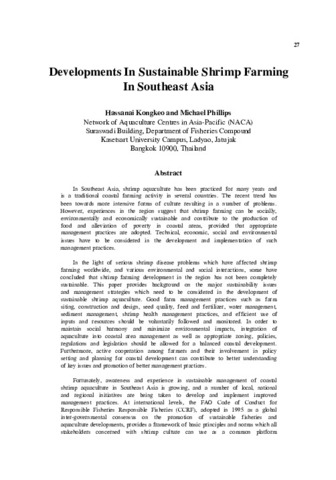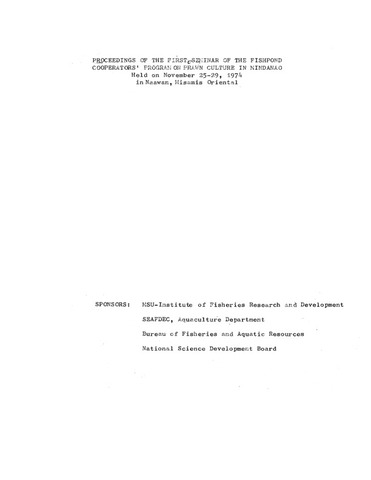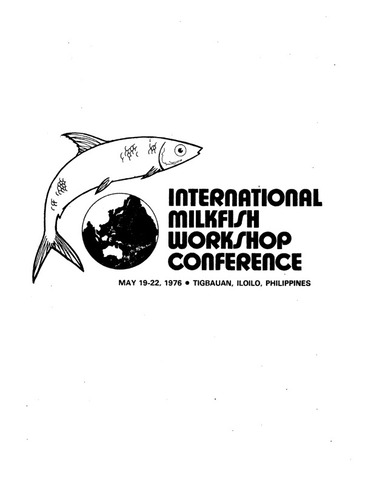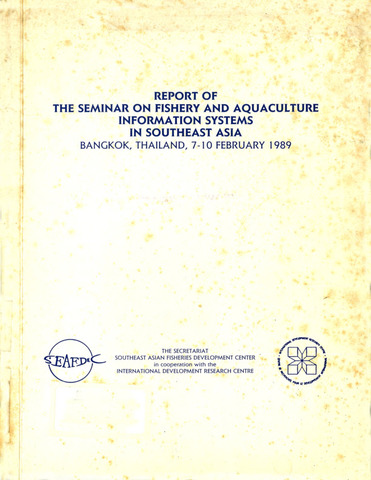Developments in sustainable shrimp farming in Southeast Asia
Share
นามธรรม
In Southeast Asia, shrimp aquaculture has been practiced for many years and is a traditional coastal farming activity in several countries. The recent trend has been towards more intensive forms of culture resulting in a number of problems. However, experiences in the region suggest that shrimp farming can be socially, environmentally and economically sustainable and contribute to the production of food and alleviation of poverty in coastal areas, provided that appropriate management practices are adopted. Technical, economic, social and environmental issues have to be considered in the development and implementation of such management practices.
In the light of serious shrimp disease problems which have affected shrimp farming worldwide, and various environmental and social interactions, some have concluded that shrimp farming development in the region has not been completely sustainable. This paper provides background on the major sustainability issues and management strategies which need to be considered in the development of sustainable shrimp aquaculture. Good farm management practices such as farm siting, construction and design, seed quality, feed and fertilizer, water management, sediment management, shrimp health management practices, and efficient use of inputs and resources should be voluntarily followed and monitored. In order to maintain social harmony and minimize environmental impacts, integration of aquaculture into coastal area management as well as appropriate zoning, policies, regulations and legislation should be allowed for a balanced coastal development. Furthermore, active cooperation among farmers and their involvement in policy setting and planning for coastal development can contribute to better understanding of key issues and promotion of better management practices.
Fortunately, awareness and experience in sustainable management of coastal shrimp aquaculture in Southeast Asia is growing, and a number of local, national and regional initiatives are being taken to develop and implement improved management practices. At international levels, the FAO Code of Conduct for Responsible Fisheries Responsible Fisheries (CCRF), adopted in 1995 as a global inter-governmental consensus on the promotion of sustainable fisheries and aquaculture developments, provides a framework of basic principles and norms which all stakeholders concerned with shrimp culture can use as a common platform for better understanding, consultation and collaboration. Examples of recent efforts by NACA, in cooperation with FAO and other interested partners, in the implementation of the CCRF are given, and suggestions are provided to further promote the sustainable development of shrimp culture. A number of researchable issues on sustainable shrimp aquaculture are also reiterated for discussion in this seminar-workshop.
การอ้างอิง
Kongkeo, H. & Phillips, M. (2001). Developments in sustainable shrimp farming in Southeast Asia. In L. M. B. Garcia (Ed.), Responsible Aquaculture Development in Southeast Asia. Proceedings of the Seminar-Workshop on Aquaculture Development in Southeast Asia organized by the Aquaculture Department, Southeast Asian Fisheries Development Center, 12-14 October 1999, Iloilo City, Philippines (pp. 27-44). Tigbauan, Iloilo, Philippines: Aquaculture Department, Southeast Asian Fisheries Development Center.
เรื่อง
คอลเลกชัน
- ADSEA '99 [21]
รายการที่เกี่ยวข้อง
แสดงรายการที่เกี่ยวข้องตามชื่อผู้แต่งผู้สร้างและเรื่อง
-
Proceedings of the First Seminar of the Fishpond Cooperators' Program on Prawn Culture in Mindanao held on November 25-29, 1974 in Naawan, Misamis Oriental
MSU-Institute of Fisheries Research and Development; Southeast Asian Fisheries Development Center, Aquaculture Department; Bureau of Fisheries and Aquatic Resources; National Science Development Board (1974) -
International Milkfish Workshop Conference, May 19-22, 1976, Tigbauan, Iloilo, Philippines
Southeast Asian Fisheries Development Center, Aquaculture Department; International Development Research Centre (Aquaculture Department, Southeast Asian Fisheries Development Center, 1976) -
Report of the Seminar on Fishery and Aquaculture Information Systems in Southeast Asia, Bangkok, Thailand, 7-10 February 1989
Southeast Asian Fisheries Development Center; International Development Research Centre (Secretariat, Southeast Asian Fisheries Development Center, 1989)The need to improve fisheries information management in the region was recognized as early as 1982 when SEAFDEC, in collaboration with IDRC, organized the Seminar on Fisheries Information Science in Southeast Asia. During ...





